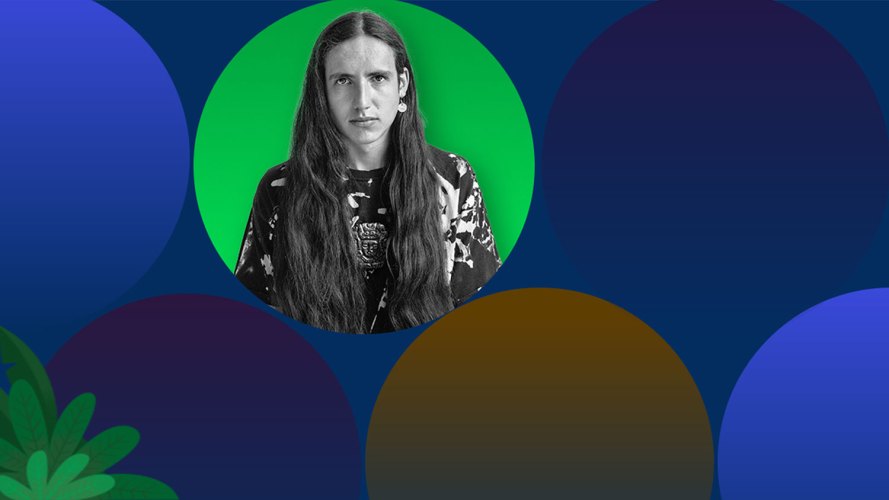Xiuhtezcatl Martinez is an Indigenous artist and environmental activist who uses his platform for change. He previously served as the youth director for Earth Guardians — an intergenerational organization that trains diverse youth to be effective leaders in the environmental, climate, and social justice movements across the globe. He is also a hip-hop artist, who makes music with this important message: community, power, and action will usher in a restored future for us all.
Here at Salesforce, we understand that bold climate action is the only way forward. Rampant wildfires, diminishing rainforests, melting ice caps, increasing natural disasters, and fogging air and water supplies are narratives that can be overwhelming and weigh heavy on us all. Martinez focuses on shifting the perspective from that which is overwhelming to empowering communities. When people know they have the ability to shift our future, they begin building relationships, investing in their community, and mobilizing to create the future they want to see.
Martinez spoke at Representation Matters, our fourth annual racial equality summit in July, where he shared his insights on using your platform for change. As he discussed the value of combining your passion with your purpose to drive change, Martinez offered insights into how we can all shape our craft for the good of the world around us.
November is Native American Heritage Month, and as we recognize the ancestry, traditions, history, and many contributions that the Indigenous community has made throughout history, it’s especially important to amplify the voices of Indigenous leaders. Read on for some ways we can all fight the issues that plague our society through our unique talents.
Recognizing the relationship between Indigenous communities and climate change
“The lives of each of my family members is rooted in strong ties to their land and connection to their culture,” said Martinez. As we, as a global community, continue coming face-to-face with the impacts of climate change, it’s important to recognize the impacts that these changes are having on Indigenous communities. Indigenous people have close relationships with the land, the environment, and its resources, so, as the United Nations reports, they are among the first to face the direct consequences of climate change.
“Our society is conditioned to see many aspects of our world as disposable. This relationship to the planet traces back to the displacement of Indigenous communities to create and develop the society we see today. When people are removed from the land their relationship to the land is broken, which leads to diminishing respect for our natural resources,” said Martinez. “The climate crisis is not an abstract future but it is actively occupying our communities through the rising tides and raging wildfires we see today. The narrative around saving the future and preserving the fate of our future generations must shift to explore the realities and situations that we build upon today that will have a lasting impact.”
Building community as a form of activism
“When I stepped on the stage at the age of six, I didn’t have all the answers of political understanding that accompanied the climate crisis, but I knew at its core the issue was about being in relation with the community,” said Martinez. The ways in which we interact with one another may seem small today, but these interactions will have a lasting impact on what our world will look and function like in the future.
“We fight to protect what we love. When we love our communities, our neighbors, our local parks and bodies of water, we will fight to preserve them,” said Martinez. “The most important work that can be done to steward our planet is to strengthen our relationship with our communities. Whether it is a climate crisis or a global pandemic we need each other. The strength that we have in our communities gives us the power to invest in mutual aid, mobilize and organize to push policy, have difficult conversations, and support our neighbors.”
Leveraging your passion for change
Anyone can be a changemaker — regardless of what your profession is or how far you are in your career. Passion and innovation are what you need to move the needle forward, whether you’re a business or a person. We’re all capable of using our platforms for change.
“As an artist, storyteller, writer, creator, or member of your community you have a place in building a more prosperous world. You must begin by asking yourself ‘who and what you make your art for?’ For me music has a way of gathering people and uplifting their spirits. It is a powerful tool for organizing and promoting change and reaches people in a way that keynote addresses or documentaries can’t do,” said Martinez. “Making art that goes against the grain opens up a brand new tool for resistance that allows you to pave the way for someone else to intersect their path with movement.”
The importance of amplifying Indigenous voices
“The way we tell our stories matter. I do my part by using my art to tell the story of my identity and struggles as a young Indigenous man growing up as a minority in mainstream America,” said Martinez. “Beyond that, I also use my passion as a way to build bridges and elevate other artists. Doing this builds a collective voice and story between us that helps move us toward change together. It is always important to ask, ‘who is being amplified to tell our stories?’ The climate crisis intersects with so many other social issues so when we imagine our future it is not just without bad weather but it is a society that is prosperous, connected, thriving, and where everyone is valued.”Artists are inherently storytellers, but we all have the ability to use storytelling as a method of strengthening our communities and implementing change. Whether we’re the ones telling the stories or amplifying them — all of it matters. As we continue to recognize the lasting impacts that the mistreatment and killing of Indigenous people, throughout history has had on Indigenous communities, it’s especially important to listen to Indigenous leaders. Meaningful change starts by honoring the lives and stories of Indigenous people. Only then will we be equipped to take the action that is needed — today, Native American Heritage Day, and every day.





![[Customer service career path]: A picture of Shonnah Hughes smiling in her maroon Serviceblazer hoodie](https://www.salesforce.com/blog/wp-content/uploads/sites/2/2024/06/Serviceblazer-Shonnah-Hughes.jpg?w=128&h=96&crop=1&quality=75)























